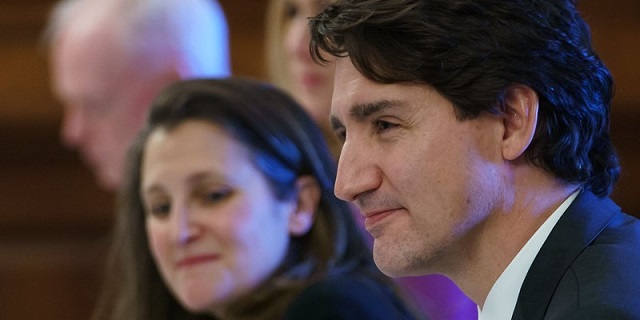Frontier Centre for Public Policy
Canada’s Leadership Vacuum Fueling a National Crisis

From the Frontier Centre for Public Policy
By David Leis
Canada is at a breaking point. Weak border security, unchecked organized crime, and rampant foreign interference have left the country dangerously exposed to threats that jeopardize its safety, economy, and sovereignty. Under Prime Minister Justin Trudeau’s leadership, these challenges have escalated to unprecedented levels, and no meaningful action has been taken to address them.
In British Columbia, a mother of two recently shared how the fentanyl crisis has ravaged her community. She spoke of losing friends and neighbours to overdoses, while her own family lives in fear of growing gang activity. Her story illustrates the human cost of systemic inaction and highlights the devastating consequences of a government unable to protect its people. It is a tragic reality mirrored in communities across the country, from urban centres to small towns, where drugs and crime are taking a growing toll.
Canada’s border management, a critical first line of defence, is failing to stem the tide of illicit goods and activities. The Canada Border Services Agency inspects less than two per cent of shipping containers entering the country, leaving ports like Vancouver vulnerable to transnational crime. According to the Cullen Commission, billions of dollars are laundered annually in British Columbia, often through casinos and real estate linked to organized crime. Transparency International’s 2022 report ranked Canada among the worst in the G7 for anti-money laundering enforcement, underlining systemic failures.
Weak border controls are exacerbating the fentanyl crisis. Precursor chemicals flow into Canada largely unchecked, often disguised as legitimate imports. Provincial officials in British Columbia have acknowledged the need for tighter regulations on pill presses, but federal laws remain inconsistent. The consequences are staggering: over 34,000 Canadians have died of opioid overdoses since 2016, according to Health Canada. These are not just numbers; they represent families shattered and communities in mourning. Yet, the federal government continues to respond with piecemeal measures instead of a comprehensive national strategy.
Concerns over foreign interference add another dimension to Canada’s vulnerability. Weak borders and lax enforcement also provide fertile ground for foreign actors to exploit. The recent inquiry into election interference revealed disturbing levels of meddling, with CSIS identifying instances of Chinese state funding for federal candidates. Hybrid warfare tactics – including cyberattacks, economic manipulation, and political interference – are well-documented. These activities undermine Canada’s sovereignty and erode trust in its democratic institutions.
International partners, particularly the United States, are taking notice. Canada’s largest trading partner has grown increasingly frustrated with these vulnerabilities. Under a potential Trump administration, Canada could face severe economic repercussions, including tariffs, if it does not address its security deficiencies. A report from the Global Initiative Against Transnational Organized Crime labelled Canada a “safe zone” for transnational crime, citing weak enforcement and limited co-ordination among intelligence agencies. Such critiques directly challenge Canada’s reputation and its role as a trusted ally.
Canada’s aging infrastructure compounds these security failures. A 2023 report from Statistics Canada revealed that nearly 40 per cent of the country’s infrastructure is nearing the end of its useful life. Ports, highways, and public utilities – critical for trade and national security – are underfunded and rapidly deteriorating. This hampers economic competitiveness and leaves Canada ill prepared to secure its supply chains. These failings highlight a broader issue: the government’s reluctance to prioritize foundational investments that ensure long-term stability.
Meanwhile, Canada’s regulatory framework struggles to keep pace with modern threats. The country lacks effective oversight to combat money laundering, cyberattacks, and supply chain exploitation. Organized crime and illicit trade drain billions from the economy every year. Weak border controls have made Canada a transit point for everything from drugs to counterfeit goods. Provincial attempts at regulation, like in British Columbia, have helped somewhat, but federal legislation has yet to catch up.
Canada’s challenges didn’t emerge overnight. They are the result of decades of underinvestment in security, weak enforcement, and a lack of political will. While the Trudeau government has failed to address these issues, previous administrations are responsible for creating the conditions that allowed them to fester.
However, the current government bears responsibility for the lack of urgency in the face of escalating crises. Performative policies, like token GST rebates, do little to address systemic issues. The Trudeau government has failed to modernize Canada’s security apparatus, prioritizing political optics over substantive reform.
Canada cannot afford to remain passive in the face of these mounting threats. The government must decisively modernize border security, combat organized crime, and confront foreign interference with meaningful legislation and enforcement. Countries like Australia have successfully implemented advanced port screening and stricter anti-money laundering laws to address similar issues. Canada must follow suit to regain control of its borders and restore trust in its institutions.
The stakes couldn’t be higher. Every uninspected container ship, every fentanyl overdose, and every election left vulnerable to interference represents a failure of leadership. The mother in B.C., fearing for her children’s future, is not alone – she represents countless Canadians who feel abandoned by a government unwilling to act. Her voice, and others like hers, demand attention.
This is no longer about politics or optics; it’s about safeguarding the nation’s future. The time for complacency has passed. Canada’s security, prosperity, and sovereignty depend on immediate, decisive leadership.
Anything less is unacceptable.
David Leis is President and CEO of the Frontier Centre for Public Policy and host of the Leaders on the Frontier podcast.
Frontier Centre for Public Policy
Canada Needs a Mandatory National Service

From the Frontier Centre for Public Policy
Retired lieutenant-general and graduate of the Royal Military College of Canada, argues Canada should establish a mandatory national service for all citizens under 30 to rebuild patriotism, civic trust, and national readiness.
Our country can’t defend itself, and citizens aren’t patriotic enough to step up. It’s time to change that.
I joined the military at the age of 18, right out of high school. My parents were working class and couldn’t afford to pay my university tuition, so although I was accepted to several good schools, I chose the Royal Military College of Canada, where I’d be considered part of the military and receive an annual salary. During the academic year, our job was to study. Then in the summer, we did military training. We graduated as second lieutenants—entry-level officers—and then did four years of military service.
I loved RMC. That’s where I learned about discipline, leadership and teamwork. After graduating I served in an armoured regiment in Quebec City, the 12e Régiment blindé du Canada. Eventually, I became a three-star general—a senior commander—and represented Canada in NATO. The military is where I met my wife, who served as a major in the Royal Canadian Air Force. Our experiences gave us a sense of purpose that’s we’ve passed down in our family: today, two of my four kids serve in the Canadian military.
But they’re in the minority. On the whole, the Angus Reid Institute finds that young Canadians are more reluctant to fight for our country than older Canadians, and pride in our armed forces has dropped significantly, from 79 per cent in 2019 to 54 per cent now. That decrease is coupled with a lack of trust in our public institutions. As of 2023, only a third of Canadians were confident in the federal parliament, and barely half reported confidence in the justice system and courts. Some might argue that Canadians are taking more pride in our country now than ever—U.S. President Trump’s tariff threats brought us together and started the “Elbows Up” boycotts—but even that has started to ebb. In any case, we shouldn’t need Trump or any outside influence to make us patriotic. Real patriotism doesn’t come through ideas and slogans, but through leadership and action. That’s why I believe that now, more than ever, Canada needs to create a mandatory national service for all Canadians under 30 years old.
The Canadian Armed Forces are facing a shortage of between 14,000 and 16,000 personnel. Meanwhile, our Arctic coastline is poised to become a site of global geopolitical competition as world powers eye its critical minerals, oil, gas and fresh water. Russian and Chinese interests in the region are expanding, and the ice is melting, opening us up to a looming scramble for northern waterways and seabed resources. If anyone wanted to come into the North and seize our natural wealth right now, there would be little we could do to stop them, short of a strongly worded diplomatic protest. We don’t have the necessary troops to defend ourselves—and the ones we do, we can barely transport up there.
Meanwhile, our country’s political, economic, and military weight has atrophied, and Canada’s international reputation is getting weaker. We’re no longer a strong player on the world stage. For example, in August, when a group of European leaders travelled to Washington, D.C. to discuss the war in Ukraine and support President Zelenskyy, Canada was not at the table—even though we are only a short flight away. We need to rebuild Canadians’ confidence before we can once again wield the weight of a strong middle power abroad. And we can do that by ensuring that Canadians love their country and are prepared to serve it.
The good news is that recent polls show strong interest in a mandatory national service program—especially if it’s broadened beyond the military. In an Angus Reid survey, 43 per cent of people supported the idea of mandatory military service, but about 70 per cent of people approved of a year-long mandatory service in the fields of public health support, environmental support, youth services and civil protection.
There’s much that young people can gain from serving their country. Early in my military career, I spent two years on exchange in France, where I commanded army conscripts. It was the late 1970s, and at the time, almost every 18-year-old male was required to serve in the French military. We received new appelés, or conscripts, right off the bus. They had long hair and lacked any prior military training or knowledge. But after 12 months of basic training, I could have taken my troop to war and won. Some of them, who had shown leadership potential, ended up becoming crew commanders in charge of an armoured vehicle.
These conscripts gained more than just the skills to shoot a rifle or drive a tank; they learned about their country and the importance of defending and serving it. Having a job to do gave them discipline, and they picked up small lessons like the importance of nutrition and staying fit. These basic but foundational habits can help set a person up for life-long health and success.
In France, a lot of the appelés hadn’t travelled much. Once they joined the military, they performed military manoeuvres across the country. When young people get to know their country and its people better, a sense of national pride emerges, along with an understanding of why their country is worth defending in the first place. In Canada, national service could have a similar effect. Imagine a young man or woman from Quebec is sent to serve in Alberta, or vice versa. How much could they learn from that experience?
Several NATO nations already have a mandatory national service system in place, including Lithuania, Estonia, Norway, Finland and Denmark. Lithuania’s system, which seeks volunteers and then uses a lottery to fill the remaining quota, is only for the military and applies to men ages 19 to 26. Estonia conscripts all men between 17 and 27, but other public service jobs are options for those with religious or moral reservations. Meanwhile, Norway’s highly selective conscription program selects several thousand of the most eligible men and women up to the age of 44, granting the nation 3.5 times more military personnel per capita than Canada.
If we’re going to have a national service program, we’ll need leaders in government to create a framework for it. In Canada, the federal government could designate several different streams of work, including defence, conservation, emergency and disaster response, health care, social services, digital infrastructure and youth development. When a young person turns 18, they would register for national service and suggest what stream they might prefer. If more people register than needed, a lottery system could determine who serves and in which stream. Those selected would enter training and take courses on civics and Canadian history, as well as stream-specific skills. They would then be deployed to a community, where they would serve for a year. Deferral beyond age 18 could be an option in some cases, as long as young people still entered service before a certain age, like 25 or 30.
Getting a system like this off the ground would require resources, training capacity and federal coordination, but it would be a worthwhile effort. Canada is faces severe wildfire seasons, an expanding cybercrime landscape and declining biodiversity. Our health-care system is anticipating a shortage of 117,600 nurses by 2030. Young people would emerge from service with a stronger sense of responsibility for their nation and the foundational skills necessary to help address the country’s biggest problems. And of course, those who choose to serve in the military could be added to the reserve, which would place Canada in a stronger position to defend itself in an increasingly aggressive world.
I envision national service as a paying job, which would make it more attractive to young people. And there could be other incentives for them to join—financial support for university, for instance, or guaranteed employment after service. Permanent residents could get a faster path to citizenship.
Citizenship in this incredible country comes with benefits, but also responsibilities. Once every young Canadian has worn a maple leaf on their shoulder, I think they’ll feel pride for their country—something that can unite us all and help Canada achieve its fullest potential.
Michel Maisonneuve is a retired lieutenant-general who served Canada for 45 years. He is a senior fellow at the Frontier Centre for Public Policy and author of In Defence of Canada: Reflections of a Patriot.
Frontier Centre for Public Policy
Churches Are All That Stands Between Canada And Tyranny

From the Frontier Centre for Public Policy
History shows that when churches are silenced, freedom falters. Calls to revoke their charitable status are a threat to liberty
Progressives are not shy about their endgame with religion.
Step by step, they seek to strip churches of their civic standing, reduce them to private clubs, and eventually banish them from public life.
In Canada, the latest salvo comes in the form of recommendations before Parliament to revoke charitable status for the advancement of religion. Pierre Gilbert, in a recent paper published by the Frontier Centre for Public Policy, warns that if this campaign succeeds, it will saddle congregations with crushing tax burdens and drive many into closure.
This is no accident. Secular activists are working to cut off resources and delegitimize faith itself. The reason is clear: churches remain one of the last institutions that uphold the idea that there is a law above the state, a truth that cannot be legislated away.
History shows that religious freedom has long served as the canary in the coal mine for liberal democracies, warning of threats to liberty.
The 20th century proved this with blood. Against Nazi and Communist totalitarianism, no secular institution matched the witness of a religiously formed conscience.
Take Dietrich Bonhoeffer, the young Lutheran pastor, who saw what many Germans preferred to ignore. Hitler’s regime demanded obedience, conformity and silence in the face of mass murder. Bonhoeffer refused.
He preached Christ over Führer. Arrested in 1943, he spent two years in prison writing letters that still inspire courage against evil today. In April 1945, he was hanged at Flossenbürg concentration camp. His last words: “This is the end—for me, the beginning of life.” His conscience, tuned to a higher authority, made him incapable of surrendering to a murderous state.
In the Soviet Union, figures like Aleksandr Solzhenitsyn and Natan Sharansky stood firm.
Solzhenitsyn was a novelist whose writings exposed the brutal realities of Soviet totalitarianism, most notably through works like The Gulag Archipelago and One Day in the Life of Ivan Denisovich. His Christian Orthodox faith became central to his resistance. His faith provided the moral clarity and the courage to frame his resistance as a defense of human dignity and divine order against the inhumanity of atheistic materialism.
Sharansky, a Jewish activist, spent nine years in Soviet prisons, much of it in solitary confinement. What sustained him was prayer, the Psalms and the conviction that his jailers could shackle his body but never his soul. He later wrote that inner freedom, rooted in faith, was the foundation of political freedom.
Romania saw the same courage in Lutheran pastor László Tőkés, who refused to bow before dictator Nicolae Ceaușescu. Armed only with Scripture, he helped topple one of Eastern Europe’s most brutal tyrannies. In December 1989, his parishioners formed a human shield around his church when the regime tried to silence him. Their courage spread across the country, culminating in Ceaușescu’s downfall.
Poland offers perhaps the clearest case of faith undermining empire.
Polish Cardinal Karol Wojtyła, Pope John Paul II, drew millions into the streets during his first pilgrimage back to Poland in 1979. “Be not afraid,” he told them. The words electrified a nation and emboldened a movement that ultimately cracked Soviet power in half.
Lech Wałęsa, an electrician at the Gdańsk shipyard, responded to the call for change. His Catholic faith anchored his commitment to human dignity in opposition to the oppressive Communist state. As he led the Solidarity movement, he proudly wore an image of Our Lady of Częstochowa on his lapel.
Even in democratic societies, religious conscience has proven indispensable. Martin Luther King Jr., a Baptist preacher, anchored the American civil rights movement not in the shifting sands of public opinion but in the conviction that all are equal before God.
His sermons drew on Amos, Isaiah and the Gospel of Christ. From Montgomery to Memphis, he taught that unjust laws lose their claim on conscience. The state could jail him, but it could not silence the truth he proclaimed.
What unites these figures is not politics but faith. Their consciences could not be traded as commodities for safety or position. They were attuned to higher ideals than obeying political leaders or fashionable orthodoxies.
Human dignity is upheld not by bureaucratic decree but by truths that governments cannot grant or revoke. This is why churches remain indispensable to Western civilization. They nurture nonconformists and people who can look at a prevailing ideology and say, “No.”
That role is not comfortable, least of all for politicians, but it is invaluable. In an era when governments govern increasingly by whim, cloaked in progressive slogans, the presence of institutions that point beyond the state serves as a safeguard against soft tyranny.
Gilbert’s warning is therefore timely. Revoking charitable status is not a bookkeeping measure. It is the deliberate weakening of the institutions that, time and again, have given birth to the men and women who resist tyranny.
A Canada that silences its churches will not long remain free.
History shows us the choice: societies with independent churches and followers who put their faith in transcendent truths produce Bonhoeffers, Solzhenitsyns, Wałęsas and Kings. Societies without them encourage conformists and tyrants.
Marco Navarro-Genie is vice-president of research at the Frontier Centre for Public Policy and co-author, with Barry Cooper, of Canada’s COVID: The Story of a Pandemic Moral Panic (2023).
-

 Business1 day ago
Business1 day agoTrans Mountain executive says it’s time to fix the system, expand access, and think like a nation builder
-

 Alberta2 days ago
Alberta2 days agoPremier Smith sending teachers back to school and setting up classroom complexity task force
-

 Crime1 day ago
Crime1 day agoSuspect caught trying to flee France after $100 million Louvre jewel robbery
-

 Addictions1 day ago
Addictions1 day agoThe Shaky Science Behind Harm Reduction and Pediatric Gender Medicine
-

 Alberta1 day ago
Alberta1 day agoThousands of Albertans march to demand independence from Canada
-

 Business2 days ago
Business2 days agoOttawa Bought Jobs That Disappeared: Paying for Trudeau’s EV Gamble
-

 Business1 day ago
Business1 day agoClean energy transition price tag over $150 billion and climbing, with very little to show for it
-

 International13 hours ago
International13 hours agoStrongest hurricane in 174 years makes landfall in Jamaica









